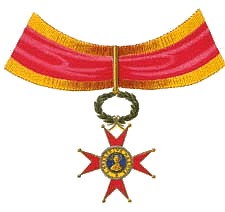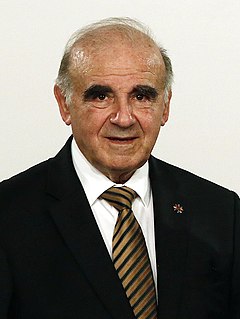1974 (MCMLXXIV) was a common year starting on Tuesday of the Gregorian calendar, the 1974th year of the Common Era (CE) and Anno Domini (AD) designations, the 974th year of the 2nd millennium, the 74th year of the 20th century, and the 5th year of the 1970s decade.
John Holland may refer to:
The George Cross (GC) is the highest award bestowed by the British government for non-operational gallantry or gallantry not in the presence of an enemy. In the British honours system, the George Cross, since its introduction in 1940, has been equal in stature to the Victoria Cross, the highest military gallantry award. It is awarded "for acts of the greatest heroism or for most conspicuous courage in circumstance of extreme danger", not in the presence of the enemy, to members of the British armed forces and to British civilians. Posthumous awards have been allowed since it was instituted. It was previously awarded to residents of Commonwealth countries, most of which have since established their own honours systems and no longer recommend British honours. It may be awarded to a person of any military rank in any service and to civilians including police, emergency services and merchant seamen. Many of the awards have been personally presented by the British monarch to recipients or, in the case of posthumous awards, to next of kin. The investitures are usually held at Buckingham Palace.
George Mitchell may refer to:
Charles, Charlie or Charley Johnson may refer to:
Richard, Rich, Dick, Dickie, or Dicky Moore may refer to:

The Pontifical Equestrian Order of St. Gregory the Great was established on 1 September 1831, by Pope Gregory XVI, seven months after his election as Pope.
Thomas, Tom, or Tommy Kelly may refer to:
George Wilson may refer to:
John McNeill may refer to:
Calvert is a given name and a surname of English, Scottish and Northern Irish origin.
The surname Bush is an English surname, derived from either the Old English word "busc" or the Old Norse "buskr," both of which mean "bush," a shrub.
Borg is a common surname in the Nordic countries as well as in Malta. Borg may refer to:

George William Vella is a Maltese politician who has served as President of Malta since 2019. A member of the Labour Party, he previously served as Deputy Prime Minister of Malta and Foreign Affairs Minister from 1996 to 1998 under Prime Minister Alfred Sant. In 2013, he returned as Foreign Affairs Minister, an office he held until 2017 under Prime Minister Joseph Muscat.
Clare is a given name, the Medieval English form of Clara. The related name Clair was traditionally considered male, especially when spelled without an 'e', but Clare and Claire are usually female.
Vella is a surname. Notable people with the surname include:
Tonio is an Italian and Spanish given name and nickname in use in Italy, Spain, parts of the United States, Mexico, Cuba, Dominican Republic, Guatemala, Honduras, El Salvador, Nicaragua, Costa Rica, Western Panama, Colombia, Venezuela, Peru, Ecuador, Bolivia, Chile, Paraguay, Argentina, Uruguay, and the Falkland Islands. As a given name it is a diminutive form of Antonio. Notable people with the name include the following:
This page is based on this
Wikipedia article Text is available under the
CC BY-SA 4.0 license; additional terms may apply.
Images, videos and audio are available under their respective licenses.

